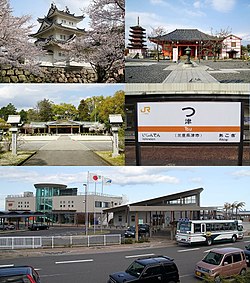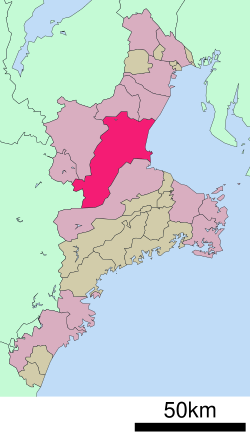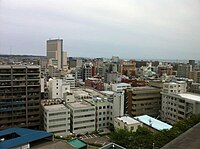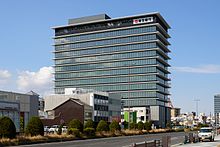Tsu, Mie
This article needs additional citations for verification. (December 2013) |
Tsu
津市 | |||||||
|---|---|---|---|---|---|---|---|

| |||||||
 Location of Tsu in Mie Prefecture | |||||||
 | |||||||
| Coordinates: 34°43′59″N 136°30′48″E / 34.73306°N 136.51333°E | |||||||
| Country | Japan | ||||||
| Region | Kansai (Tōkai) | ||||||
| Prefecture | Mie | ||||||
| Government | |||||||
| • -Mayor | Yasuyuki Maeba (since May 2011) | ||||||
| Area | |||||||
• Total | 711.11 km2 (274.56 sq mi) | ||||||
| Population (August 2021) | |||||||
• Total | 274,879 | ||||||
| • Density | 390/km2 (1,000/sq mi) | ||||||
| Time zone | UTC+9 (Japan Standard Time) | ||||||
| Symbols | |||||||
| • Tree | Zelkova serrata | ||||||
| • Flower | Azalea | ||||||
| • Bird | Japanese bush warbler | ||||||
| Phone number | 059-229-3110 | ||||||
| Address | 23-1 Nishi-Marunouchi, Tsu-shi, Mie-ken 514-8611 | ||||||
| Website | Official website | ||||||




Tsu (津市, Tsu-shi) is the capital city of Mie Prefecture, Japan. As of 31 July 2021[update], the city had an estimated population of 274,879 in 127,273 households and a population density of 390 persons per km2.[1] The total area of the city is 711.11 square kilometres (274.56 sq mi). Although the second largest city in the prefecture in terms of population (behind Yokkaichi), its designation as the prefectural capital and its holding of a large concentration of national government offices and educational facilities make the city the administrative and educational center of Mie Prefecture.
Geography
[edit]Tsu is located in east-central Kii Peninsula, in central Mie Prefecture. It is the largest city in Mie Prefecture in terms of area and stretches the width of Mie Prefecture, and is bordered by Ise Bay on the Pacific Ocean to the east, and Nara Prefecture to the west. Parts of the city are within the limits of the Murō-Akame-Aoyama Quasi-National Park.
Neighboring municipalities
[edit]- The city of Iga, to the west
- The city of Kameyama, to the north
- The city of Matsusaka, to the south
- The city of Nabari to the west
- The village of Mitsue, Nara to the west
- The village of Soni, Nara to the west
- The city of Suzuka, to the north
Climate
[edit]Tsu has a humid subtropical climate (Köppen Cfa) characterized by warm summers and cool winters with light to no snowfall. The average annual temperature in Tsu is 15.6 °C. The average annual rainfall is 1931 mm with September as the wettest month. The temperatures are highest on average in August, at around 26.7 °C, and lowest in January, at around 5.0 °C.[2] Precipitation is significant throughout the year, but is heaviest from May to September.
| Climate data for Tsu (1991−2020 normals, extremes 1889−present) | |||||||||||||
|---|---|---|---|---|---|---|---|---|---|---|---|---|---|
| Month | Jan | Feb | Mar | Apr | May | Jun | Jul | Aug | Sep | Oct | Nov | Dec | Year |
| Record high °C (°F) | 19.0 (66.2) |
22.8 (73.0) |
25.9 (78.6) |
31.0 (87.8) |
33.9 (93.0) |
36.7 (98.1) |
39.1 (102.4) |
39.5 (103.1) |
37.7 (99.9) |
31.0 (87.8) |
27.2 (81.0) |
23.7 (74.7) |
39.5 (103.1) |
| Mean daily maximum °C (°F) | 9.5 (49.1) |
10.0 (50.0) |
13.4 (56.1) |
18.6 (65.5) |
23.1 (73.6) |
26.2 (79.2) |
30.4 (86.7) |
31.6 (88.9) |
28.0 (82.4) |
22.6 (72.7) |
17.1 (62.8) |
12.0 (53.6) |
20.2 (68.4) |
| Daily mean °C (°F) | 5.7 (42.3) |
5.9 (42.6) |
9.0 (48.2) |
14.2 (57.6) |
19.0 (66.2) |
22.7 (72.9) |
26.8 (80.2) |
27.9 (82.2) |
24.4 (75.9) |
18.8 (65.8) |
13.2 (55.8) |
8.1 (46.6) |
16.3 (61.3) |
| Mean daily minimum °C (°F) | 2.4 (36.3) |
2.4 (36.3) |
5.2 (41.4) |
10.2 (50.4) |
15.4 (59.7) |
19.7 (67.5) |
24.0 (75.2) |
25.0 (77.0) |
21.4 (70.5) |
15.5 (59.9) |
9.5 (49.1) |
4.6 (40.3) |
12.9 (55.2) |
| Record low °C (°F) | −7.8 (18.0) |
−7.0 (19.4) |
−5.6 (21.9) |
−3.0 (26.6) |
3.0 (37.4) |
9.0 (48.2) |
14.6 (58.3) |
14.6 (58.3) |
8.7 (47.7) |
2.3 (36.1) |
−1.4 (29.5) |
−6.4 (20.5) |
−7.8 (18.0) |
| Average precipitation mm (inches) | 48.5 (1.91) |
57.1 (2.25) |
104.5 (4.11) |
129.0 (5.08) |
167.3 (6.59) |
201.8 (7.94) |
173.9 (6.85) |
144.5 (5.69) |
276.6 (10.89) |
186.1 (7.33) |
76.4 (3.01) |
47.2 (1.86) |
1,612.9 (63.50) |
| Average snowfall cm (inches) | 2 (0.8) |
3 (1.2) |
0 (0) |
0 (0) |
0 (0) |
0 (0) |
0 (0) |
0 (0) |
0 (0) |
0 (0) |
0 (0) |
1 (0.4) |
6 (2.4) |
| Average precipitation days (≥ 0.5 mm) | 6.4 | 7.5 | 10.5 | 9.8 | 10.9 | 12.8 | 12.3 | 9.8 | 12.3 | 10.1 | 6.8 | 6.5 | 115.7 |
| Average relative humidity (%) | 61 | 61 | 62 | 64 | 68 | 74 | 75 | 73 | 72 | 69 | 65 | 63 | 67 |
| Mean monthly sunshine hours | 162.9 | 156.2 | 186.1 | 192.7 | 197.8 | 146.9 | 180.2 | 220.7 | 165.3 | 164.5 | 163.7 | 171.5 | 2,108.6 |
| Source: Japan Meteorological Agency[3] | |||||||||||||
Demographics
[edit]Per Japanese census data,[4] the population of Tsu has been relatively stable over the past 40 years.
| Year | Pop. | ±% |
|---|---|---|
| 1960 | 226,065 | — |
| 1970 | 242,000 | +7.0% |
| 1980 | 265,443 | +9.7% |
| 1990 | 280,384 | +5.6% |
| 2000 | 286,521 | +2.2% |
| 2010 | 285,728 | −0.3% |
History
[edit]Origin
[edit]Tsu originally developed as a port town known as Anotsu (安濃津) in the Nara and Heian periods.
The port was destroyed by a tsunami in the 1498 Meiō Nankaidō earthquake.
-
Kitabatake Family Residence Gardens(Kitabatake Shrine)
Edo period
[edit]The town was rebuilt as a castle town and a post station by the Tōdō clan, daimyō of Tsu Domain under the Tokugawa shogunate. During the Edo period, it became a popular stopping point for travelers to Ise Grand Shrine, about 40 km to the southeast.
-
This is a map of Tage castle or Kiriyama castle in Edo period.
Modern Tsu
[edit]Following the Meiji Restoration, Tsu became the capital of Mie Prefecture in 1871. With the establishment of then modern municipalities on April 1, 1889, Tsu was one of the original 31 cities to be proclaimed. The city borders gradually expanded, with Tsu annexing the neighboring villages of Tatebe and Tosa in 1909, Shinmachi in 1934, Fujimi in 1936, Takachaya in 1939 and Anto, Kanbe and Kushigata in 1943. During World War II, Allied air raids on July 24 and July 28, 1945, destroyed most of the city and killed 1,239 people. In 1953, Tsu annexed the neighboring villages of Kumozu in 1953, Isshinden, Shiratsuka, Kurima, and Katada in 1954 and Toyosato in 1973.
-
Tsu Shinsekai before 1945
On January 1, 2006, the neighboring city of Hisai, the towns of Anō, Geinō and Kawage, and the village of Misato (all in Age District), the towns of Hakusan, Ichishi and Karasu, and the village of Misugi (all in Ichishi District) were merged into Tsu. As a result of the merger, the city became the second largest in Mie by population behind Yokkaichi, and the largest in Mie by area ahead of Matsusaka.
Government
[edit]Tsu has a mayor-council form of government with a directly elected mayor and a unicameral city council of 34 members. Tsu contributes seven members to the Mie Prefectural Assembly. In terms of national politics, the city is part of Mie 1st district of the lower house of the Diet of Japan.
Economy
[edit]This section needs expansion. You can help by adding to it. (February 2016) |

Imuraya Confectionery, a confectionery company,[5] and ZTV, a cable television operator, are headquartered in Tsu.[6]
Education
[edit]Colleges and universities
[edit]- Mie Prefectural College of Nursing
- Mie University, the prefecture's only national university.
- Takada Junior College
- Tsu City College
Primary and secondary education
[edit]- Tsu has 48 public elementary schools and 19 public middle schools operated by the city government, one public elementary school and one public middle schools affiliated with Mie University and two private middle schools. The city has nine public operated by the Mie Prefectural Board of Education and three private high schools
- The prefecture also operates six special education schools for the disabled.
Transportation
[edit]


Railway
[edit]- Ise-Hata - Ichishi - Isegi - Ise-Ōi – Ise-Kawaguchi - Sekinomiya - Ieki - Ise-Takehara - Ise-Kamakura - Ise-Yachi - Hitsu - Ise-Okitsu
- Chisato - Toyotsu-Ueno - Shiratsuka - Takadahonzan - Edobashi - Tsu - Tsu-shimmachi - Minamigaoka - Hisai - Momozono
Ise Railway - Ise Railway Ise Line
- Ise-Ueno – Kawage – Higashi-Ishinden - Tsu
Highway
[edit]Expressway
[edit]Japan National Route
[edit] National Route 23
National Route 23 National Route 163
National Route 163 National Route 165
National Route 165 National Route 306
National Route 306 National Route 368
National Route 368 National Route 369
National Route 369 National Route 422
National Route 422 National Route 306]
National Route 306]
Sea Ports
[edit]Sister cities
[edit] Higashishirakawa, Gifu, since June 28, 1989
Higashishirakawa, Gifu, since June 28, 1989 Osasco, São Paulo, Brazil, since October 18, 1976[7]
Osasco, São Paulo, Brazil, since October 18, 1976[7] Zhenjiang, Jiangsu, China, since June 11, 1984[7]
Zhenjiang, Jiangsu, China, since June 11, 1984[7]
Local attractions
[edit]Tsu is famous for its Tōjin Odori (唐人踊り), a festival commemorating the arrival of the Joseon Tongsinsa delegation from Korea during the feudal period.[8] There are two other cities that celebrate Tōjin Odori: Suzuka city in Mie Prefecture and Ushimado-chō in Okayama Prefecture.[9]
The ruins of Tsu Castle have been made into a downtown city park.
Kitabatake Shrine and Yūki Shrine are notable local Shinto shrines.
Culture
[edit]Sports
[edit]Baseball
[edit]- Mie Takatora baseball club (JABA)
Volleyball
[edit]- Veertien Mie (V.League)
Notable people
[edit]- Sho Gokyu, professional soccer player
- Yuki Hashimoto, politician, former idol
- Mu Kanazaki, professional soccer player
- Kintaro Kanemura, professional wrestler
- Kōji Kitao, sumo wrestler
- Kotokaze Kōki, sumo wrestler
- Yoshihito Nishioka, professional tennis player
- Ayumi Oka, actress
- Hiroshi Okuda, former president of Toyota Motors
- Keisuke Okuda, professional wrestler
- Edogawa Rampo, author
- Chikara Sakaguchi, politician
- Kōdō Sawaki, Zen Buddhist
- Hidesaburō Ueno, agricultural scientist
- Saori Yoshida, Olympic wrestler
References
[edit]- ^ "Tsu city official statistics" (in Japanese). Japan.
- ^ Tsu climate data
- ^ 気象庁 / 平年値(年・月ごとの値). Japan Meteorological Agency. Retrieved May 19, 2021.
- ^ Tsu population statistics
- ^ "Corporate profile." Imuraya Confectionery. March 30, 2008. Retrieved on January 11, 2010.
- ^ Home page. ZTV. Retrieved on October 2, 2009.
- ^ a b "International Exchange". List of Affiliation Partners within Prefectures. Council of Local Authorities for International Relations (CLAIR). Archived from the original on 5 February 2016. Retrieved 21 November 2015.
- ^ https://www.searchnavi.com/~hp/tojin/eng/ Toujin House
- ^ https://www006.upp.so-net.ne.jp/asao/toujin.htm 唐人踊り (Tōjin Odori)
External links
[edit]- Official website
 (in Japanese)
(in Japanese)  Geographic data related to Tsu, Mie at OpenStreetMap
Geographic data related to Tsu, Mie at OpenStreetMap









